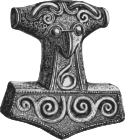- Wyrd
-
For other uses, see Wyrd (disambiguation).
Wyrd is a concept in Anglo-Saxon culture roughly corresponding to fate or personal destiny. The word is ancestral to Modern English weird, which retains its original meaning only dialectally.
The cognate term in Old Norse is urðr, with a similar meaning, but also personalized as one of the Norns, Urðr (anglicized as Urd) and appearing in the name of the holy well Urðarbrunnr in Norse mythology. The concept corresponding to "fate, doom, fortunes" in Old Norse is Ørlǫg.
Contents
Etymology
The Old English term wyrd derives from a Common Germanic term *wurđíz. Wyrd has cognates in Old Saxon wurd, Old High German wurt, Old Norse urðr, Dutch worden (to become) and German werden. The Proto-Indo-European root is *wert- "to turn, rotate", in Common Germanic *wirþ- with a meaning "to come to pass, to become, to be due" (also in weorþ, the notion of "worth" both in the sense of "price, value, amount due" and "honour, dignity, due esteem").
Old English wyrd is a verbal noun formed from the verb weorþan, meaning "to come to pass, to become". The term developed into the modern English adjective weird. Adjectival use develops in the 15th centrury, in the sense "having the power to control fate", originally in the name of the Weird Sisters, i.e. the classical Fates, in the Elizabethan period detached from their classical background as fays, and most notably appearing as the Three Witches in Shakespeare's Macbeth. From the 14th century, to weird was also used as a verb in Scots, in the sense of "to preordain by decree of fate".
The modern spelling weird first appears in Scottish and Northern English dialects in the 16th century and is taken up in standard literary English from the 17th century. The regular modern English form would have been wird, from Early Modern English werd. The substitution of werd by weird in the northern dialects is "difficult to account for".[1]
The now most common meaning of weird, "odd, strange", is first attested in 1815, originally with a connotation of the supernatural or portentuous (especially in the collocation weird and wonderful), but by the early 20th century increasingly applied to everyday situations.[2]
Fate in Germanic mythology
Wyrd is a feminine noun, and its Norse cognate urðr, besides meaning "fate", is the name of one of the Norns; urðr is literally "that which has come to pass", verðandi is "what is in the process of happening" (the present participle of the verb cognate to weorþan) and skuld "debt, guilt" (from a Germanic root *skul- "to owe", also found in English shall).
Between themselves, the Norns weave fate or ørlǫg (from ór "out, from, beyond" and lǫg "law", and may be interpreted literally as "beyond law"). According to Voluspa 20, the three Norns "set up the laws", "decided on the lives of the children of time" and "promulgate their ørlǫg". Frigg, on the other hand, while she "knows all ørlǫg", "says it not herself" (Lokasenna 30). ørlǫglausa "ørlǫg-less" occurs in Voluspa 17 in reference to trees (as opposed to humans).
Mentions of wyrd in Old English literature include The Wanderer, "Wyrd bið ful aræd" ("Fate remains wholly inexorable") and Beowulf, "Gæð a wyrd swa hio scel!" ("Fate goes ever as she shall!").
References
- ^ OED. c.f. phonological history of Scots.
- ^ OED; c.f. Barnhart, Robert K. The Barnhart Concise Dictionary of Etymology. Harper Collins ISBN 0-06-270084-7 (1995:876).
See also
Anglo-Saxon paganism and mythology Gods and divine figures Heroic figures Other beings Locations Sources Origins Society and culture Neopagan revival Norse paganism Deities,
heroes,
and figuresOthersAsk and Embla · Dís (Norns · Valkyries) · Dwarf · Einherjar · Elves (Light elves · Dark elves) · Fenrir · Hel · Jörmungandr · Jötunn · Sigurd · Völundr · Vættir
Locations Asgard · Bifröst · Fólkvangr · Ginnungagap · Hel · Jötunheimr · Midgard · Múspellsheimr · Niflheim · Valhalla · Vígríðr · Wells (Mímisbrunnr · Hvergelmir · Urðarbrunnr) · YggdrasilEvents Sources Society See also Time in religion and mythology Time and fate deities · Eternity · Eschatology · Golden Age · Divination · Prophecy · Fate · CalendarCategories:- Anglo-Saxon paganism
- English goddesses
- Germanic paganism
- Magical terms in Germanic mysticism
- Norse mythology
Wikimedia Foundation. 2010.
